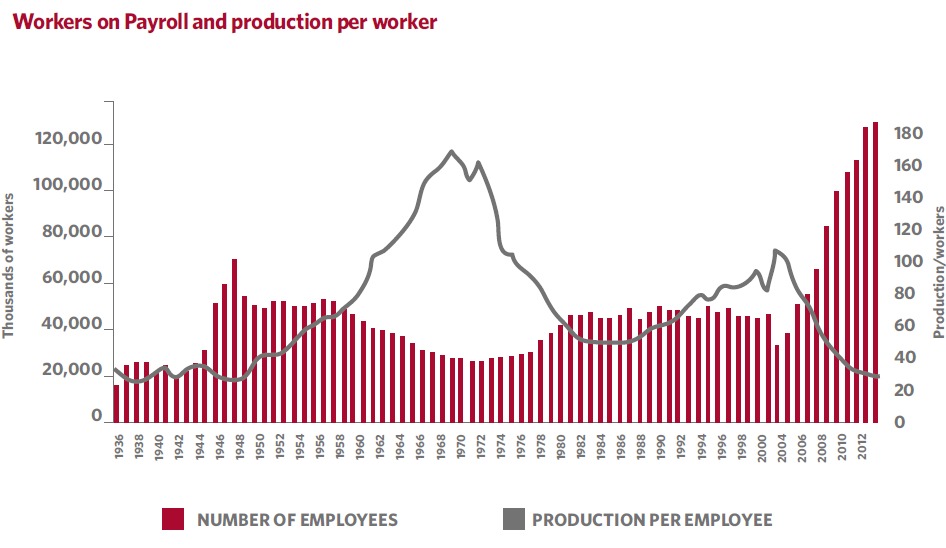Nobody Wants to Work For this ‘Gobierno Obrero’
Why show up if you’ll be underpaid and blackmailed into proclaiming allegiance to the revolution. It’s easier to demand food from the "Gobierno Obrero" that wants workers to remain poor.


Photo: Pulsa América retrieved
A press release, supposedly from Central Bank workers, circulated through WhatsApp and was even published in La Patilla on April 23. Though I still have doubts about its authorship, it tackled an openly discussed issue nowadays: public workers are resigning or requesting their retirement en masse because bad salaries no longer compensate the inconvenience of working according to the whims of the Gobierno Obrero.
The Chávez government built a massive public payroll, that reached 2.6 million in the second semester of 2013, an increase of 92.7% when compared with the first semester of 1999. And this didn’t just happen by chance. Chávez claimed that the working class was the essence of the socialist project, and he was absolutely right.
Chavismo wants citizens to depend on the State, and it helps if they’re poor. Why? Dead simple: to guarantee loyalty and votes.
As anyone remotely following Venezuela knows, the productivity of the public sector (GDP of the public sector divided by public payroll) decreased exactly by 14.2% during Chávez’ government. If this wasn’t shocking enough, PDVSA’s payroll more than doubled between 2004 and 2013 and its productivity, well, check it out for yourself:
Source: IESA, “Venezuela: Energy in Figures 2013”, p.16
The lack of official data makes it difficult to prove that the productivity of the public sector has continued to decline during the Maduro government. However, the collapse of all major public services and even PDVSA’s production levels seem to be proof enough.
Truth be told, working for the public sector used to have its perks: relatively good salaries and great work benefits (including HMO). Of course, some workers didn’t do a good job or work at all and still collected their salaries (and some even got to participate in very profitable corruption schemes).
But since the economic crisis ahora es de todos, no public servants, with the exception of the ruling party high ranks, are immune to it. El Metro de Caracas and Ciudad Guayana’s basic industries don’t pay enough to eat. Doctors that work and, most importantly, save lives in public hospitals, are demanding “dignified wages.” PDVSA’s workers are even passing out on the job.
So it shouldn’t come as a surprise that workers are resigning en masse. 18,000 professionals and technicians resigned from Corpoelec between March 2017 and March 2018, and around 25,000 PDVSA workers of all ranks left their posts between January 2017 and January 2018.
It’s pretty telling when nobody wants to work for a government that has proudly proclaimed itself a “Gobierno Obrero.” Maybe, just maybe, such government actually works for the interests of the ruling party and ran out of money to keep the loyalty of its workers.
Caracas Chronicles is 100% reader-supported.
We’ve been able to hang on for 22 years in one of the craziest media landscapes in the world. We’ve seen different media outlets in Venezuela (and abroad) closing shop, something we’re looking to avoid at all costs. Your collaboration goes a long way in helping us weather the storm.
Donate





